Milanović: Croatian Troops in Kosovo "No Provocation Against Serbia"
ZAGREB, 8 May (Hina) - President Zoran Milanović said on Saturday that the decision to increase Croatian troops in Kosovo was not an act of provocation against Serbia.
"That's no provocation against Serbia. The Serbian authorities do not know how to get out of the trap into which they fell 30 years ago with Milošević's orgy in Kosovo that caused the war in Yugoslavia. ... The question of the independence and status of the Albanian people is a topic that brought about the war, actually several wars," Milanović said in response to questions from the press during a visit to the eastern city of Đakovo.
Serbian President Aleksandar Vučić said Serbia wanted to have good relations with all its neighbors but that Croatia's actions and statements showed no respect for Serbia but attempted to humiliate it.
Vučić said that Croatia could have refused to send more troops to Kosovo as part of the NATO-led KFOR peacekeeping mission and that its decision was aimed at "further humiliating Serbia."
Milanović recalled that the Croatian contingent has been present in Kosovo for years and that its presence has been increased now that Croatian troops have left Afghanistan.
"I have already signed this order, but had I been aware that it would bother them so much, we might have discussed it," said Milanović, who also serves as Commander in Chief of the Croatian Armed Forces.
As for the presence of Croatian troops in other countries, he said that the Croatian military need not always be present somewhere and that its primary task was to protect Croatia.
"Croatian soldiers are here, first and foremost, to protect Croatia. It is their main and sole basic task, while these other forms of cooperation are welcome," Milanović said.
"Kosovo has been recognized as a state virtually by the entire EU, except five member states. I understand why two of them have not, but as for the other three, I do not understand because I followed this matter and talked with their prime ministers and presidents several times in the past," Milanović said.
Cyprus, Greece, Romania, Spain, and Slovakia are the only EU members that have not recognized Kosovo, a former Serbian province, as an independent state.
Milanović also noted that the Serbian authorities "are doing all they can so as not to join the European Union, even though they are ostensibly negotiating."
"We are not on an equal footing. We are an EU member, and they are not. If they want to join, we have to talk. It never occurred to us to treat other countries so rudely and presumptuously, for example, Slovenia, which is smaller than Croatia but was an EU member (before Croatia joined the EU)," Milanović said.
Serbia was granted EU membership candidate status in 2012. It opened accession talks in 2014 and has provisionally closed only two chapters to date.
"I do not want to use Croatia's position to blackmail Serbia, but my impression is that there is no real ambition at all on Serbia's part to join the EU in 15 years. That is perhaps because in that case, all the people now ruling Serbia would have to look for their homeland elsewhere," the Croatian president said.
For more news, follow TCN's dedicated page.
Milanović: Government's Proposal on Sunday Work an Election Gimmick
May 8, 2021 - President Zoran Milanović on Saturday reiterated his view on Sunday work, saying that the government's plan to ban Sunday work partly was an election gimmick.
Prime Minister Andrej Plenković announced amendments to the Commerce Act on Thursday, under which the number of Sunday shopping days would be limited to 16 a year. He said that the move was not contrary to the government's desire for greater employment and higher growth, stressing the need to balance work and family life.
Answering questions from the press during a visit to the eastern city of Đakovo, Milanović said that the government's proposal was insincere. "It's always the same election gimmick by the government. They don't need it. Again, it won't change anything," the President said.
"People work from morning to night, and they don't have time to go shopping" except on Sundays, he said, noting that he personally would prefer if shopping centers were closed on Sundays, "but that is not about work." He said that another problem was that "we would be telling people when they can go to the shops."
Milanović said that he personally does not go shopping on Sundays but that he is aware that most people "do not have this comfort."
Asked to comment on the union's proposal for workers who are not union members to be taxed, Milanović said that he generally supported the work of the unions, particularly those in private companies.
"However, this has become very difficult because of atomization. People used to work in large companies, and it was relatively easy to organize them, while that is more difficult today. This is now reduced to public-sector unions in which fewer people work because most work in the private sector. If the unions are weak, the employers will trample them. The state is still the most decent employer," Milanović said, reiterating that "in the end, it all boils down to the trade unions in the public sector, state administration, and hospitals."
For more, follow our politics section.
Foreign Parents in Split Region Mostly Content with Croatian Public Schools
May 8, 2021 - Foreign parents in the Split region are mostly content with Croatian public schools, reveals a survey conducted amongst volunteering expat parents.
The survey conducted amongst volunteering expat parents shows that most families are content or even very happy regarding their experience with public schools in Croatia. The scale went from 5 for perfect to 1 for failure, where the middle ground (3) was that the experience had ups and downs and that families would either recommend others to look for a different school or be prepared for a bumpy ride. The perfect experience meant that the child was happy in school, the teachers gave a good education, and the parents were treated well. A failure meant that the parents felt that the experience was a total disaster, that they either thought about changing the school or actually did, and that child and parents were relieved and happy when that time was over.
It is not hard to guess that the experience was better the younger the children were when they arrived in Croatia, and the more the family spoke Croatian at home. In general, it looks like there is a very different perspective based on the three schooling systems of lower primary school/ niži razredi osnovna škola (1st-4th grade), higher primary school/ viši razredi osnovna škola also called middle school in many countries (5th-8th grade), and high school/srednje škole also called middle school or secondary school in Croatia (9th-12th grade).
In general, most families felt very well about the schooling in grades 1-4. This is probably not only because the children are still more open to learning a new language but also because the schooling system is still mostly aimed at "entertaining" the children and caring deeply for the well-being of the children rather than focusing on the transfer of knowledge. Also, the peer pressure is more positive as local children at younger ages welcome foreigners and love interacting and playing with anyone regardless of the background or the language barrier.
However, when children are in grades 5-8, there seems to be a huge discrepancy between newcomers and children who have already been to school in Croatia before or have spoken Croatian at home. The school system changes from a single class teacher in classes 1-4 for most subjects to many specialized teachers in most subjects, while the class teacher is then only a teacher that sees the children in one or two subjects. Also, the general approach to education seems to take its toll on the children. Apart from what happens in school, this is a demanding time for children due to entering adolescence and seeing life and others with different eyes. Peer pressure seems to take on negative aspects that are not being channeled properly.
For this age group, parents who have just arrived with their kids and who have little Croatian language skills have a rather negative or stressful experience, whereas parents who have been living in Croatia for some time or who have been speaking Croatian at home seem to have a mostly positive experience with the public school education in classes 5-8.
This discrepancy in experiences then not only increases even more for grades 9-12, but the number of parents who decide to move to Croatia with children in that age group also shrinks dramatically compared to families who moved to Croatia with younger children.
Unfortunately, two families had to go through a terrible experience with their children. In both cases, bullying is mentioned explicitly as the encountered problem. In both cases, the families felt that the school (not the same school) could not deal with the problem properly and protect the children. It is unknown if the parents chose to change the school because of such problems, but it is unfortunate to hear that the families felt like the teachers did not do enough to help remedy the situation in both cases.
For further reading about the structure of Croatian public schools, you may want to read:
https://eacea.ec.europa.eu/national-policies/eurydice/content/organisation-single-structure-education-1_bg
https://www.expatincroatia.com/international-elementary-kindergartens-primary-schools-croatia/
About the author:
We moved to Croatia together with our son almost 5 years ago and had some mixed experiences since he started to go to school here in 3rd grade. We built a little web project for the idea of an international school in Split and continue to share our experience happily. The site has been live now for almost 4 years at www.misodis.com. Now we cross-checked ours with the experience of other parents.
We will soon share with you some more information on what you may want to know and what you can do to get ready for your move to Croatia and to be better prepared to face the challenges of the Croatian public school system.
For more, follow our lifestyle section.
First Croatian-Korean Film 'Crisis' Recently Finished Filming in Zagreb
May 8, 2021 - The fiction film Crisis will be the first Croatian-Korean film and the first Croatian film to feature an Asian actor as the protagonist.
The short film will follow the day in the life of 20 something-year-old Ji-Hu, who is working for his father's Korean restaurant in Zagreb, as the delivery boy, during the current global pandemic. Throughout his delivery runs across Zagreb, he will not only have to deal with the constant pressure from his father and an odd variety of customers but also trying to adjust in a world where he still hasn’t found his place yet.
This story comes from a desire to show an authentic portrayal of a foreign immigrant's life in Croatia, specifically residents from Asia. The inspiration for telling an “immigrant tale” arose from the creator’s own experiences living as an immigrant in America. Additionally, this film will highlight the struggles of small private businesses across the world who are struggling to make ends meet because of the pandemic.
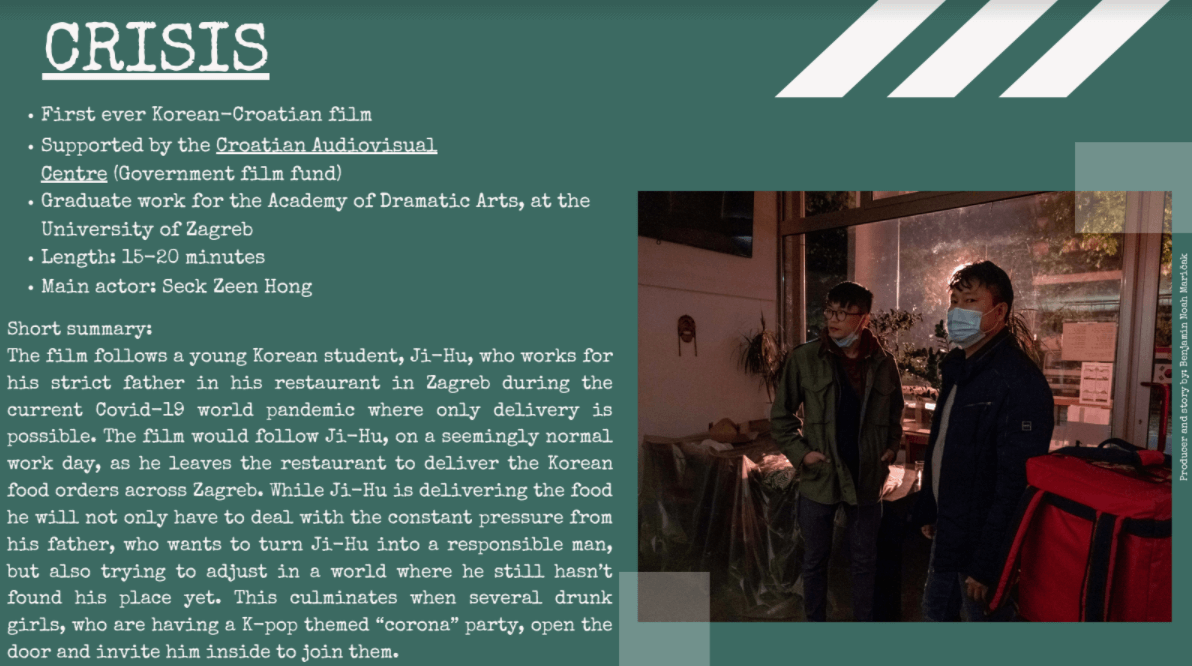
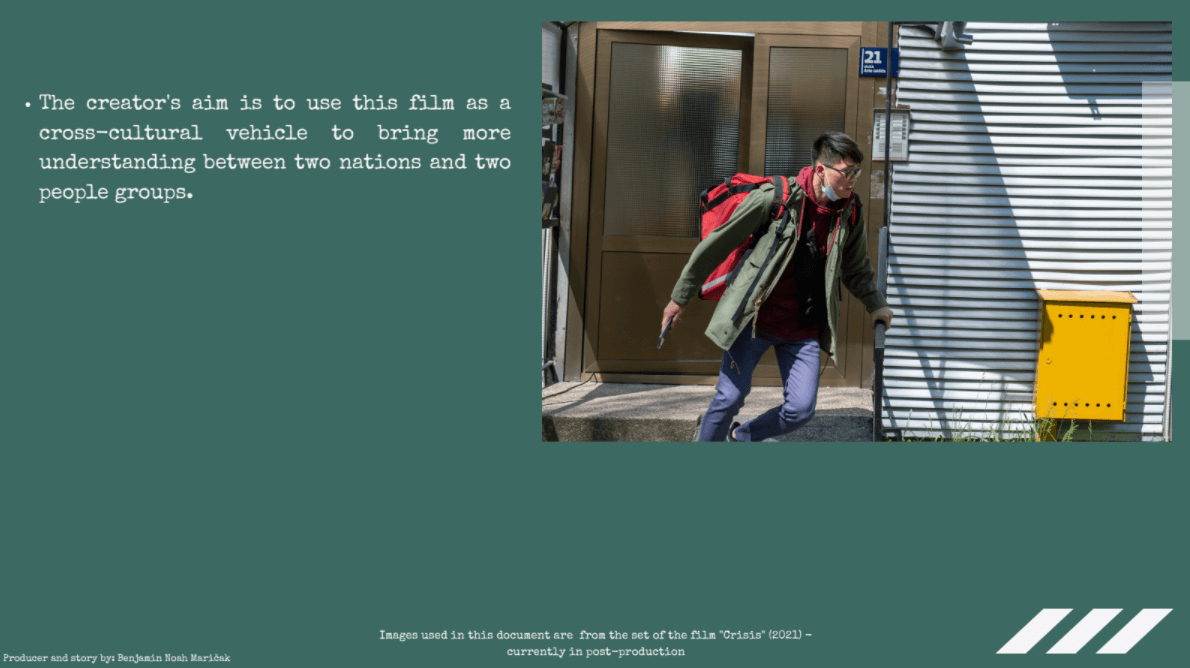
Crisis is the graduate film for Benjamin Noah Maričak, a third-year undergraduate student of Production at the Academy of Dramatic Arts at the University of Zagreb - who serves as the Producer and Creator of the film. The chief creative team consists of Director Boris Vuković, Cinematographer Marko Milohnić, and Screenwriter Karla Leko.
In the lead roles are Seck Zeen Hong, as the film’s protagonist, and You Kwang Kim, as Ji-Hu’s father. Both of which are making their cinematic debuts in leading roles. The rest of the cast consists of Croatia’s premier emerging talents, such as Lara Nekić, Igor Jurinić, Klara Fiolić, Tara Dorotić, Lucia Luque Akrap, Laura Bošnjak, Laura Anić-Kaliger, and Dora Dimić Rakar. Alongside them appear acting veterans Fabijan Pavao Medvešek and Alemka Sappe.
The film is financially supported by the Croatian Audiovisual Centre (HAVC) and is currently being edited, with plans to premiere.
For more, follow our lifestyle section.
New Destination for Digital Nomads in Split: SPAlato Spa
May 8, 2021 - Digital nomads in Split can now work at SPAlato Spa in the Radisson Blu Hotel, with free Wi-Fi and a relaxation zone. You may also want to book a treatment to destress your mind and body while you’re there…
The digital nomad lifestyle can sometimes be rough on my posture and my brainwaves. I live on a computer and some days it feels like I’m becoming a piece of the furniture, hunched over a keyboard with a never-ending to-do list. Recently, I had enough. I desperately needed a massage to release my tight muscles and clear my head. I decided to check out the spa at the Radisson Blu hotel near my apartment. I went there last year just before the pandemic shut things down and I enjoyed a terrific treatment with a stunning view of the Adriatic Sea.
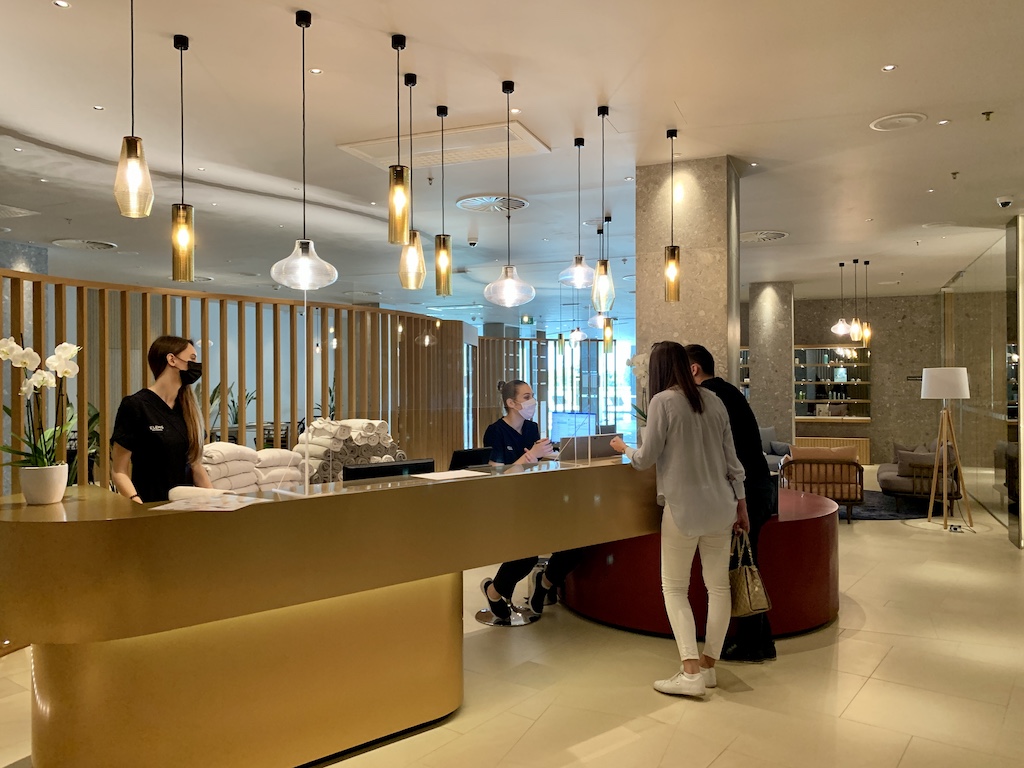
SPAlato Spa opened in a completely renovated space on May 1, including treatment rooms, pools, a sundeck, relaxation zone, fitness center, and a yoga studio.
Cool vibe
A year ago the spa was under renovation and this time I was glad to see the new space. I went on a Sunday morning and the first thing I noticed was the cool ambiance with jazz music and a lounge vibe. I loved it immediately. It reminded me of places I used to go back home to settle in and relax with the Sunday New York Times and a pot of coffee.
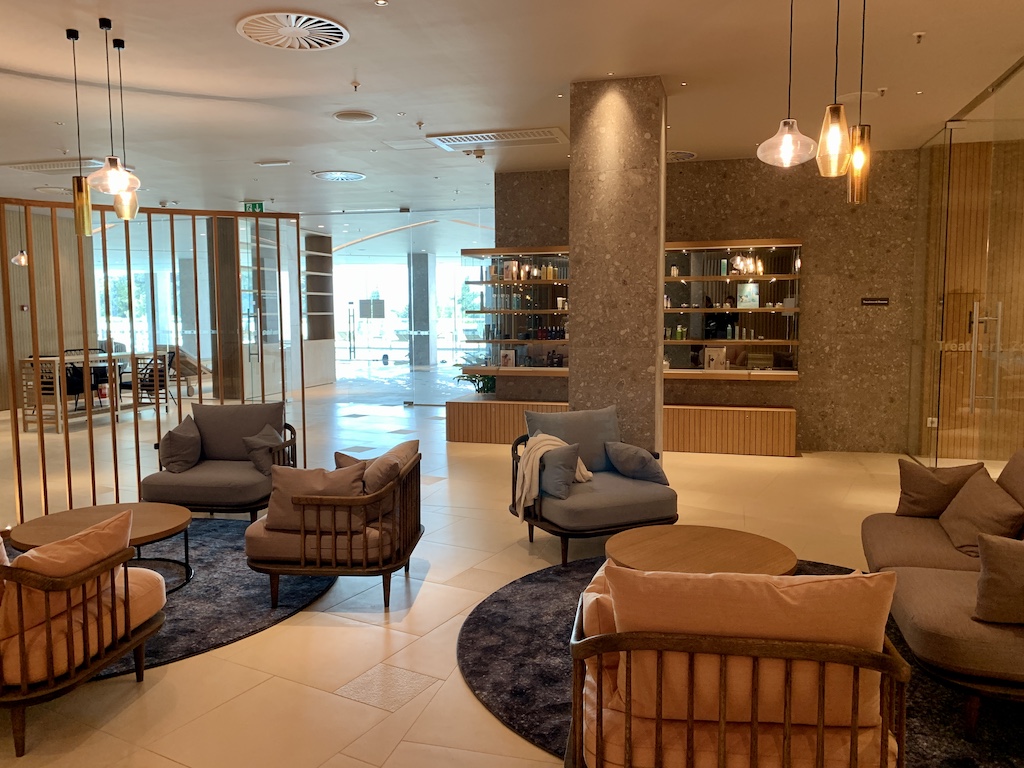
A lounge area includes a retail display for purchasing organic products used during treatments.
I scheduled a facial and a massage and I arrived early to swim and sweat in the sauna before my treatments. The spa was airy and light, which I like, and the design was minimal yet elegant. I was delighted to find several different “zones” where I could hang out, including comfy couches near the pool and an outdoor sunbathing terrace. Later I found out that the designated Relaxation Zone has Wi-Fi, is kid-free, and it’s where I can set-up and work for a day. Wait a minute, what?
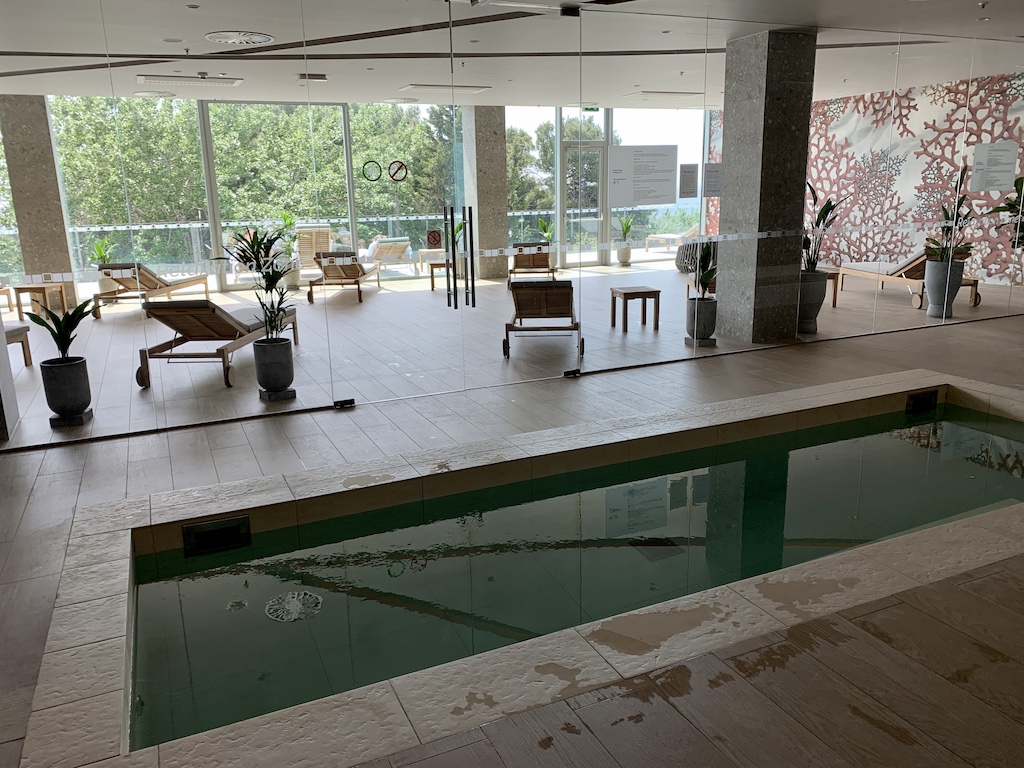
Digital nomads can set up shop in the Relaxation Zone, Wi-Fi included, and alternate between work and spa amenities.
No more WFH (work from home)
The concept was mind-blowing. The SPAlato (a cute name playing up Spa with the old Italian name for Split) could replace my dining table office and allow me to take breaks from the computer in any number of spots: indoor and outdoor pools, gym, sauna, steam room, whirlpool, cold and hot plunge pools, or a yoga studio. And there’s another bonus for this spa and wellness devotee—I could tackle the enticing list of treatments.
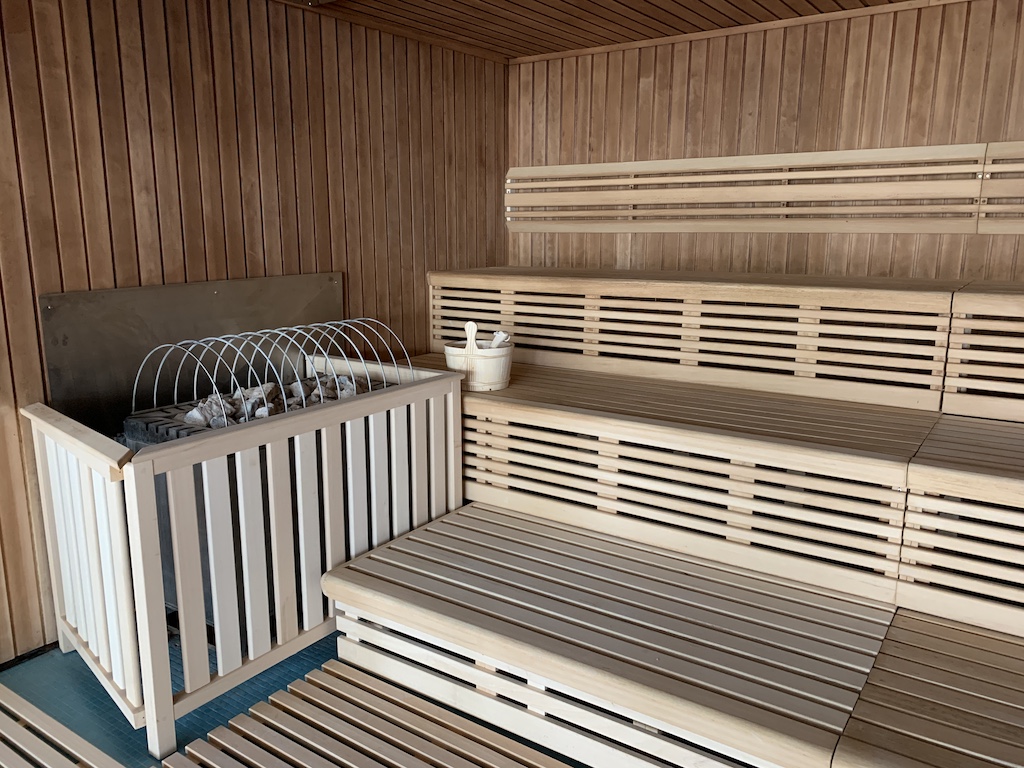
Brand new saunas are fresh and let you build up heat before jumping in the pool.
TCM (traditional Chinese massage) with a certified Chinese therapist; Power of the Sea—a combination of marine salt scrub, aromatherapy with local essential oils, a bath, full body massage, body wrap, and finisher with local immortelle oil; and other treatments promised to restore my body and mind energies.
It seems decadent, and perhaps dangerous in regard to keeping work deadlines, but my body would be so grateful and my mind would be so happy.
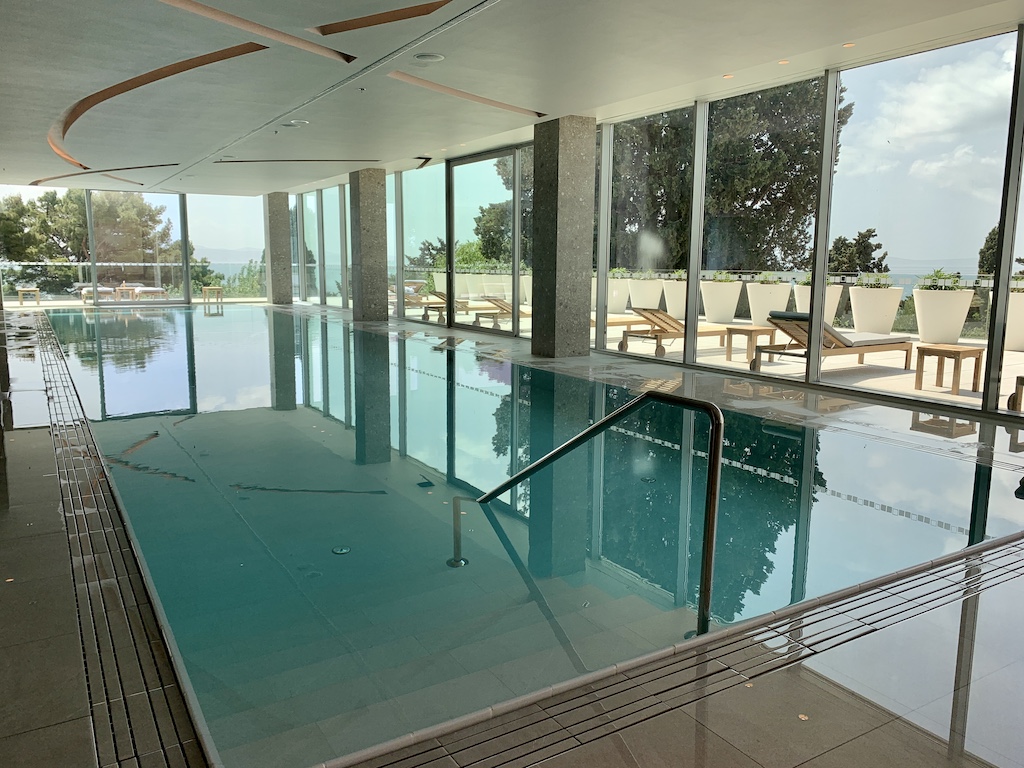
The indoor pool is surrounded by glass, giving a sense of being outdoors and close to nature.
Treatments
My therapist Doris asked what kind of massage I like and I said sports or deep-tissue. Every therapist I’ve ever said that to has interpreted it differently. For all the good massages, I’ve also endured being rubbed with inexperienced, weak hands and pounded with killer claws. Not this time. Doris not only had the right touch, she knew how to apply pressure in the correct way to get my muscles flowing. Yesss!
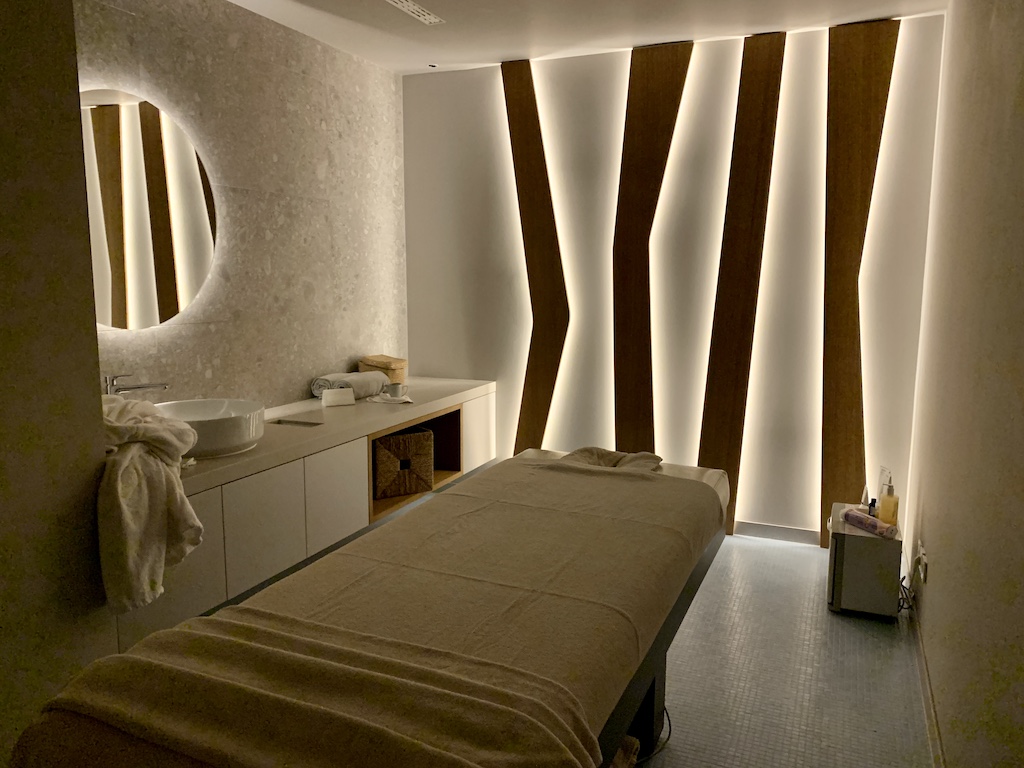
Treatment rooms are comfortable and calming, an ideal environment to relax.
She also did my facial and explained the steps and the products used, including my particular skin type needs. Small details in both treatments made all the difference, starting with the bowl of water and eucalyptus oil she held under my nose before we began. Oh my, I inhaled deeply. I’ve had enough treatments over the years to know that every place is different and charming in its own way. That also sets a benchmark for quality and this place rates high on my list.
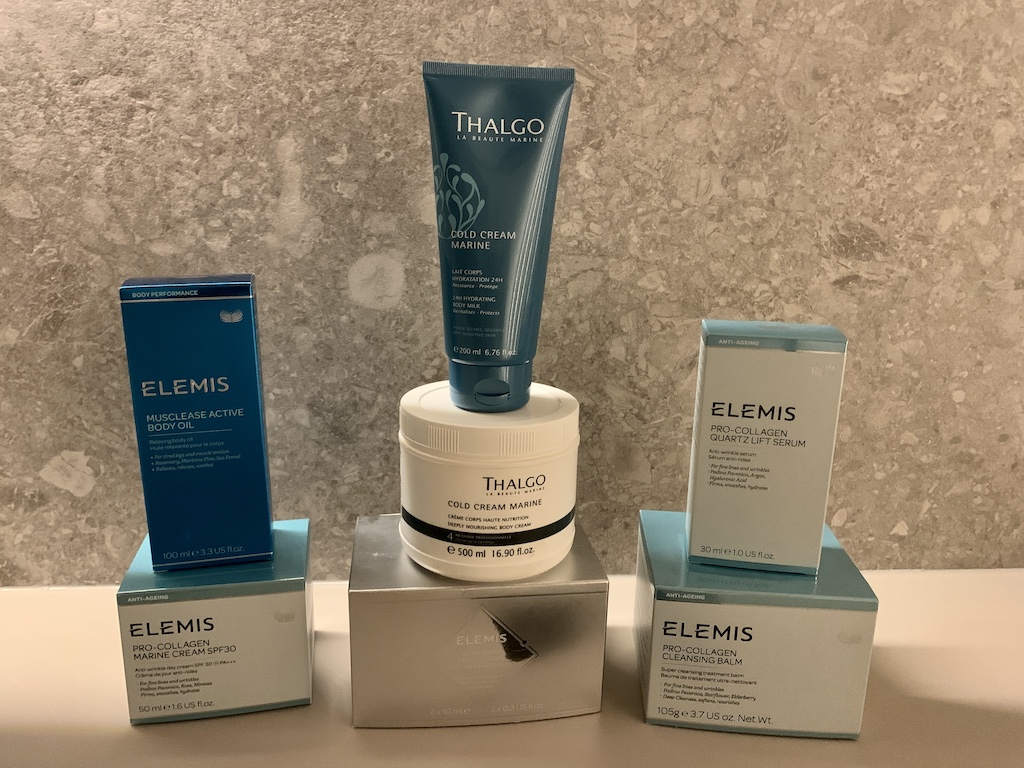
Thalgo and Elemis spa products are organic and made with marine ingredients for maximum effectiveness.
Mediterranean experience
I spent the rest of my time on the upper dining terrace, looking over the sea and eating a fresh salad. It couldn’t have been nicer. I can’t believe I’m contemplating my future workspace in a spa; how cool would it be to be the first digital nomad to claim a co-working seat at SPAlato.
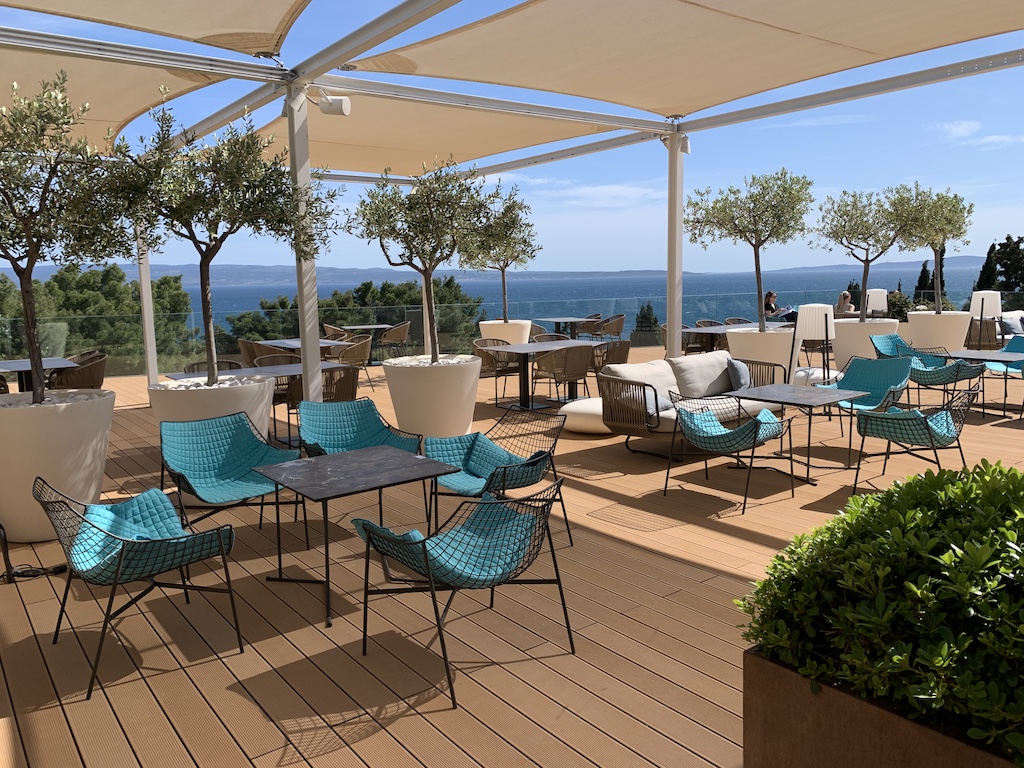
An upstairs dining terrace offers Mediterranean food and drinks in a casual, elegant atmosphere.
Learn more about SPAlato on Radisson Blu’s website.
Learn more at TCN’s Digital Nomads channel.
Story and photographs ©2021, Cyndie Burkhardt. https://photo-diaries.com
Croatia's Coronavirus Update: 1,342 New Cases, 36 Deaths,1,866 Recoveries
ZAGREB, 8 May 2021 - Over the past 24 hours, 1,342 new cases of coronavirus infection have been confirmed in Croatia, and there have been 36 related deaths bringing the death toll to 7,424, the national COVID-19 crisis management team said on Saturday.
The number of active cases in Croatia today stands at 10,705. There are 2,016 COVID patients in hospitals, 235 of whom are on ventilators.
Since 25 February 2020, when Croatia registered its first case of the infection with the novel virus, a total of 343,829 people have been registered as having contracted coronavirus, and 325,700 have recovered, including 1,866 n the last 24 hours.
There are 28,152 people in self-isolation.
To date, 1,871,290 people have been tested, including 7,985 over the past 24 hours when the percentage of positive tests stood at 17%.
One in four adults vaccinated against COVID-19
Since the start of the implementation of the vaccine rollout plan at the beginning of this year, 835,320 people have been vaccinated. Of them, nearly 244,000 have received both shots of the two-dose vaccine.
The Croatian Institute of Public Health underscores that to date 25% of the adult population has received COVID vaccines.
For all you need to know about coronavirus specific to Croatia, including travel, border, and quarantine rules, as well as the locations of vaccination points and testing centres across the country, make sure to bookmark our dedicated COVID-19 section.
Croatia and Hungary Facilitate Tourist Travel Between Border
May 8, 2021 - As the season approaches, Croatia and Hungary have reached an agreement to lift restrictions on citizens crossing the border with a vaccination certificate.
The vaccination process is still underway and the cases of infections continue to decrease in Croatia, and it is thus that, as the summer season unfolds, Croatia and its neighbor to the east have reached a bilateral agreement recognizing each other's vaccination certificates with any COVID-19 vaccine.
As hrturizam.hr reports, this is an agreement which, with the presentation of a vaccination certificate, will enable unhindered travel of Croatian and Hungarian citizens between the two countries, and which will be able to cross borders without restrictions, such as mandatory self-isolation or negative test.
This is great news ahead of the main part of the tourist season, during which the highest intensity of tourist traffic is expected in Croatia.
As they point out from the CNTB, good trends from the Hungarian market are confirmed by today's virtual presentation and business workshop organized by the Representation of the Croatian Tourist Board in Budapest in cooperation with the Zadar County Tourist Board. This virtual event brought together more than 110 participants, and almost 300 individual meetings will be held during the day.
"The great interest of Hungarian partners for virtual presentations and business workshops is a good indicator for the tourist season. In addition to reminding all participants of the beauties of Croatia, and especially Zadar County, we informed them about the current travel conditions between the two countries. The news of concluding a bilateral agreement between Croatia and Hungary came at the right time, and a large number of Hungarians will surely choose Croatia as their destination", said Ivana Herceg, director of the Croatian National Tourist Board in Budapest, adding that the first airline between Budapest and Zadar, which will operate twice a week from July, will also contribute to good trends.
Follow the latest on flights to Croatia HERE and the latest travel updates and COVID-19 news from Croatia HERE.
For more on travel in Croatia, follow TCN's dedicated page.
Doctors at KBC Zagreb Successfully Perform a Caesarean Section on Respirator-Bound COVID Patient
May 8, 2021 – Doctors at KBC Zagreb were forced to use an unconventional procedure to save two lives when faced with a pregnant COVID patient whose condition was becoming life-threatening.
Doctors in University Hospital Centre Zagreb (KBC Zagreb) managed to perform quite a feat. They did a successful C-Section procedure on a pregnant woman with a bad case of COVID. The patient had to use a respirator to help her breathe. The procedure in question is a brand new technique that is rare in practise.
The University Hospital Centre Zagreb dates back to 1942 and is the country's biggest hospital. It also acts as a teaching hospital for the University of Zagreb's medical programs. KBC Zagreb is one of the country’s most renowned medical institutions with a long tradition of highly skilled medical professionals. So, it doesn’t come as a surprise the team at this institution was the one to do such a complex and risky procedure so successfully.
Urgent Procedure
As reported by index.hr the patient was 32 weeks pregnant. She came to the hospital with a bad case of COVID. The disease compromised her lungs and the doctors decided to put her on a respirator. Seeing how the condition was life-threatening to both the patient and her baby, they eventually decided to do a Caesarean Section. The procedure involved using an unconventional method that was technically very demanding. Circulation was routed through a dialysis machine and special filter in order to reduce the inflammation process and stabilise the patient. At the same time, aided by a team of gynaecologists, the C-Section was successfully performed and the baby was saved.
Both the mother and the child recovered. The hospital released the child already, while the mother is expecting to go home next week. In the end, the exciting story got a happy conclusion. KBC Zagreb doctors once again proved they are deserving of their professional reputation.
Medical professionals in Croatia continue their exhausting fight against the COVID19 epidemic. They urge the population to follow the safety guidelines and help prevent the spread of the disease. It is important to note how KBC Zagreb is working at full capacity. But the recent trend of a slow, but steady drop in the number of new cases is making everyone a bit more optimistic
For more about Covid-19 in Croatia, follow TCN's dedicated page.
21 Presidents From EU Member-States Forward Europe Day Message
May 8, 2021 - Croatian President Zoran Milanović, together with other presidents of the European Union's member-states, forwarded a joint message on the occasion of Europe Day on Saturday.
Extending their best wishes to the Europeans, the 21 presidents from the European Union called on EU citizens to use the Conference on the Future of Europe as the "unique opportunity to shape our common future," reads a press release issued by the Office of Croatian President.
"This Europe Day is special. For the second year in a row, we celebrate it in the challenging circumstances of the COVID-19 pandemic. We sympathize with all those who have suffered because of it," those leaders say.
They underscore the importance of the Conference on the Future of Europe which starts on this year's Europe Day.
"The circumstances surrounding this discussion on the future of Europe are very different from those of previous years. It may seem that there is not sufficient time for an in-depth discussion on the future of Europe in the current situation. On the contrary, the COVID-19 pandemic has reminded us of what is truly important in our lives: our health, our relationship with nature, our relationships with our fellow human beings, mutual solidarity, and working together. It has opened up questions about the way we live our lives. It has shown the strengths of European integration, as well as its weaknesses. We need to talk about all of this," say those leaders.
Challenges are manifold
"The challenges we face as Europeans are manifold: from tackling the climate crisis and the creation of green economies, while concurrently balancing the increasing competition among the global actors, to striving for the digital transformation of our societies. We will need to develop new methods and new solutions. As democracies, our strength lies in engaging the many voices of our societies to identify the best way forward. The more people participate in a broad and open-minded discussion, the better for our Union.
The European project is a project of peace and reconciliation.
"The European project is unprecedented in history. It has been 70 years since the signing of the Treaty establishing the European Coal and Steel Community and 64 since the birth of the European Community in Rome. At that time, European leaders found ways to unify war-torn Europe. Thirty years ago, Europe’s East and West began to connect more closely. Very different countries joined together to form the European Union. Each country has its own historical experiences and burdens of the past, which it deals with on its own and in its relations with other countries," reads their message.
"The European project is a project of peace and reconciliation. It has been so since its conception and remains so today. We advocate for a common strategic vision for Europe, a Europe that is whole, free, united, and at peace.
Fundamental principles of European integration extremely relevant
"All the fundamental principles of European integration remain extremely relevant today: freedom, equality, respect for human rights, the rule of law and freedom of expression, solidarity, democracy and loyalty among the Member States. How can we jointly ensure that these fundamental principles of European integration remain relevant for the future?
"Although the European Union may sometimes seem ill-equipped to face the many challenges that have arisen over the last decade – from the economic and financial crisis to the challenges in working towards a just and equitable EU migration system and the ongoing pandemic – we are aware that it would be much harder for each of us if we were alone.
"How can we best strengthen European cooperation and solidarity and make sure that we emerge from the health crisis in a way that makes us more resilient to future challenges?
"We need a strong and effective European Union, a European Union that will be a global leader in the transition to sustainable, climate neutral, and digitally supported development. We need a European Union we can all identify with, certain in the knowledge that we have done our utmost for the benefit of future generations. Together, we can achieve this.
We need to think about our common future, and therefore, the signatories of this joint message invite European "to join the discussion and help find a way forward together."
For more, follow our politics section.
Plenković Says Porto Social Summit Important Event
May 8, 2021 - Prime Minister Andrej Plenković, who participated in the EU Social Summit in Porto on Friday, said that this summit meeting after such gathering in Gothenburg was an important event as it was held when all the heads of state or government were focused on the protection of workers.
"This Social Summit, which is being held after such summit in Gothenburg four years ago, is important as it is being held when all the heads of state or government (of EU member-states) are focused on the protection of workers," he said.
"I have intended to underscore the importance of the state's role in the last 15 months. It is only the state that could deal with the issues in that period, he added."
In this context, he recalled that 10 billion kunas had been set aside for the job retention measures, including grants for workers, support to shortening working hours, and the coverage of the fixed costs in Croatia.
He went on to say that his cabinet aims to raise the employment rate from the current 67% to 78% until 2030.
Since 2016 when the first term of his cabinet started, 110,000 more jobs have been created, according to Plenković.
All the heads of state or government from EU member states, but Germany, the Netherlands, and Malta, attended the Porto meeting.
EU leaders, European institutions, social partners, and civil society representatives met in Porto to reinforce their commitment to implementing the European Pillar of Social Rights.
At the high-level conference organized by the Portuguese presidency in the context of the Porto Social Summit, they discussed how to set the European social policy agenda for the next decade and ensure that we face the present and future challenges, leaving no one behind.
The discussions revolved around three main areas: work and employment, skills and innovation, the welfare state, and social protection.
At the end of the conference, EU institutions, European social partners, and civil society representatives co-signed the Porto Social Commitment.
For more, follow our politics section.


